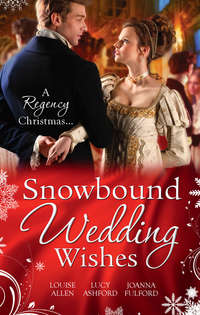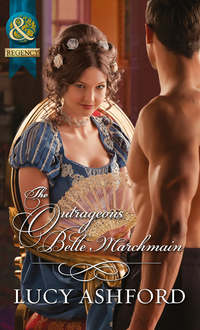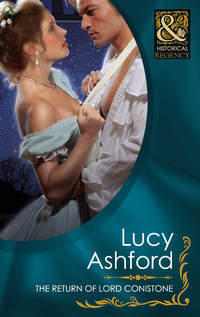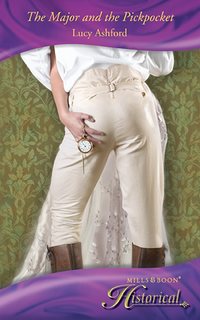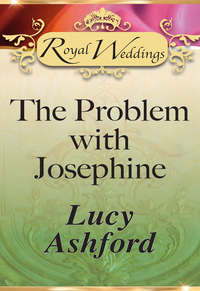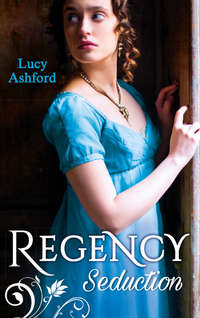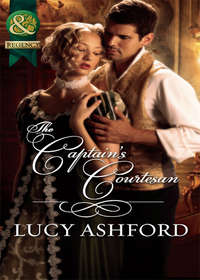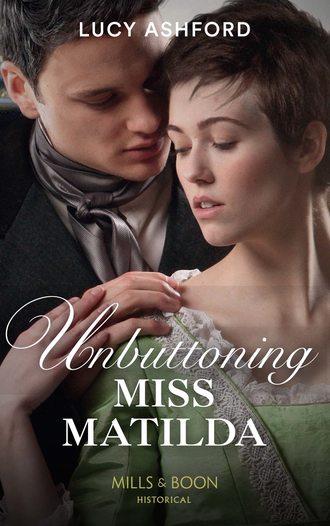
Полная версия
Unbuttoning Miss Matilda
* * *
She hurried on towards the wharf, where as usual the quayside was lined with horses and heavily laden carts and the air was filled with the banter of the teams of Irishmen building the new warehouses close by. Once on board The Wild Rose, she stowed her purse in the cabin locker, then went through her list of jobs to be done.
I need to put more varnish on the tiller, she reminded herself. And I’ll take my mattress on deck to air for an hour in the sunshine...
She began to roll her mattress in order to carry it up the steps. But as she did so, she caught sight of her reflection in the little mirror hanging on the cabin wall.
Something seemed different somehow about her eyes and her expression. And there was an unfamiliar sensation fluttering in her stomach like a light and teasing touch, making her restless and unsettled. Unfortunately she thought she knew exactly what—or rather who—had caused it. Shaking her head, she carried her rolled cotton mattress up on deck and spread it out.
Jack Rutherford was a rogue, undoubtedly. He truly hadn’t a clue about the fact that the majority of his goods were worthless trash—and even worse, he didn’t seem to care. But he’d also shown he could be rather formidable—his ruthlessness in tackling those villains had been quite chilling. Despite his teasing ways there was a stark maleness about him that thoroughly rattled her—and when he’d rested his hand on her shoulder, the warmth of his fingers had sent little sparks of surprise tingling all along her veins.
She thumped hard at the mattress. That man must have more dark secrets than she’d had hot dinners. Yes, his smile was light-hearted, but Jack Rutherford was made for trouble—trouble she could most certainly do without.
She went back down to her cabin. There were plenty more jobs to be getting on with, but something made her want to take out her silk purse again from her locker and examine her treasures once more.
So she did. And it was then that she realised, with a jolt of sickening shock, that the most precious of them all—the golden Roman coin—was not there.
For two years now, she’d been haunted by memories of the day her father found that coin. He’d believed it marked the site of an old Roman settlement—believed, in fact, that he was on the verge of the most exciting discovery of his career—but he’d died soon afterwards. On the day of his funeral, Matty had stood beneath the solemn yews by his grave and silently repeated the vow she’d made to her father as his life slipped away. She would pursue his dream and she would find that site herself, whatever it cost, whatever it took, to ensure that her father’s name was always remembered with reverence.
But instead, she’d lost the only proof of the site’s existence—the Roman coin.
For a moment Matty couldn’t move. Then she went over to check her coat, just in case, but both pockets were empty. Her heart was hammering now and her throat was dry.
You fool, Matty. You absolute fool.
Chapter Four
It didn’t take long for Jack to persuade the reluctant innkeeper to pay the pie girls, after which he announced to them that he had another visit to make that afternoon.
‘I’m going to Mayfair,’ he told them.
‘Mayfair?’ The women gasped a little. ‘My, aren’t you the fancy one?’
But if the girls imagined him arriving in Mayfair’s streets in style, they were mistaken. True, Jack smartened himself up by giving his one decent coat a good brush and cleaning his boots; he’d tied on a plain cravat and he’d shaved. But the effect was rather spoiled by the fact that he hitched a ride from Paddington with the driver of a corn cart, a chatty fellow who was clearly surprised to have an apparent member of the gentry as a passenger. When Jack told him to stop at the corner of fashionable Park Lane, the driver looked even more startled. Of course, thought Jack, the people who lived hereabouts wouldn’t usually arrive on a corn cart, unless it was for a drunken bet.
He tipped the driver handsomely—which again caused the man’s mouth to gape—and walked on to nearby Grosvenor Square where, on reaching an imposing mansion, he struck the door so loudly that the butler opened up with a look of distinct apprehension on his face.
But the butler’s caution swiftly melted away. ‘Why, Master Jack! It’s truly good to see you, sir!’
‘Hello, Perkins,’ Jack responded. ‘It’s good to see you, too. How are you? Keeping well, I trust?’
‘Well enough,’ answered Perkins darkly, ‘considering the circumstances, if you understand what I mean. If you’ll wait here a moment, I will see if Lady Fitzroy has come down yet from her bedchamber.’
Lady Fitzroy. Damn, would he ever get used to that? And—her bedchamber, at this hour? ‘Are you saying she’s been unwell?’
‘She is, as you know, sir, in a delicate state of health. But I will ascertain if she’s risen.’
So Jack waited, which meant he had time to think about the events of the day so far—in particular the lad in the long coat and the hat pulled down low. The lad with the brooches and the Roman coin.
Jack had become well used over the years to summing people up. Sometimes in the army he’d had to decide in the blink of an eye whether a man was friend or foe, because it could mean life or death. That lad had loitered in the shadows, which was enough in itself to set alarm bells ringing. His long coat was scruffy, he was slightly built and that wide-brimmed hat shaded half of his face. His voice was a little gruff, which you could say was typical of a lad trying to sound older than he was.
Except he was a she. The boy was a girl.
If he—she—had kept the visit short, Jack might have been fooled. But in no way could the girl keep up the pretence during the fight with those bully-boys. During that brief but vicious scrap her voice had slipped back to its natural register and she’d been forced to abandon her male swagger completely as the action speeded up.
Then when that big hat of hers slipped back to let the candlelight fall on her face, he’d felt the breath hiss from his lungs—because her chestnut hair, cropped like a boy’s, gave her an unusual elfin charm. Her features were refined, her skin delicate—and her clothes, drab and over-large though they were, still couldn’t obscure the fact that she was slender and graceful. Before she crammed that ridiculous hat back on, he’d had a full view of her pretty green eyes and charming little nose and, most noticeable of all, he’d observed an extremely kissable mouth.
Only it seemed she preferred using her lips for verbal sparring than for any kind of amorous encounter.
He paced the hall as he waited for Perkins to return. The girl had a sharp tongue—and she used it. She’d been damnably rude, yet somehow he’d felt more thoroughly alive trading insults with her than he had for a long time. But then, there was another puzzle.
She knew about antiques. She knew about history. She couldn’t be more than what, eighteen or so?—but in her scornful assessment of Jack’s premises, she’d betrayed the education of a scholar. And there was yet another surprising facet to her character. Jack could have been in real trouble when those villains burst in on him, were it not for the way she neatly came to his rescue. She had courage and ingenuity, as well as learning.
A puzzle indeed.
It was at this precise point that Perkins returned. ‘I am pleased to say, Mr Rutherford, that Lady Fitzroy will see you in the morning room.’
Jack declined Perkins’s offer of escort and made his own way along the hall, briefly glancing at the grandiose objets d’art positioned everywhere—paintings, sculptures and onyx-topped tables.
His first thought: I could sell all this for a tidy sum.
His second: I’d prefer to sling the lot in the Thames.
Darkly relishing the notion, Jack climbed the wide staircase to the first floor, where his mother was in the morning room, reclining on a sofa. She looked extremely pretty in her gown of flowered muslin—fragile, too. Then again, thought Jack grimly, anyone would be fragile if they were married to Sir Henry Fitzroy.
‘Jack,’ she said as he crossed the room to bow over her hand. ‘Oh, Jack, how good to see you!’
He drew a chair up close. ‘How are you, Mama?’
She sighed. ‘I feel that I could be well again, if only I could return to Charlwood. If only I could live there again, in the countryside. London doesn’t suit me, I fear.’
It was all too clear London didn’t suit her, thought Jack. And it ought to be clear to her brute of a husband also! Suddenly he felt all kinds of emotions well up inside—regret and more—but for now he forced his feelings down and drew a slim little jewellery case from his pocket. ‘Here,’ he said. ‘A present for you, Mama.’
He handed her the leather case and watched her open it. Inside was a bracelet he’d discovered in a cluttered drawer at the back of Mr Percival’s place—a pretty little thing made of gilt and paste, hardly worth any more than the case he’d put it in. But he guessed his mother wouldn’t care in the slightest.
He was right. ‘Oh, Jack, darling,’ she declared. ‘I love it! It’s so pretty!’ And she fastened it round her wrist straight away.
His mother was like a child in her enjoyment of simple things. She was also like a child in her underestimation of how cunning some people could be—take his recently acquired stepfather, for instance, Sir Henry Fitzroy. Jack watched her as she stroked and admired the bracelet, thinking that, although in her late forties, his mother was still like a china doll with her blue eyes and fair hair and delicate skin. And like a china doll, she was so easily broken.
‘Is he here?’ Jack asked shortly. He didn’t need to spell out who he meant.
His mother hesitated. ‘No. Henry had an appointment with his bank and then he was going on to his club.’
‘Good timing,’ Jack said. His mother knew very well what he thought of her second husband. ‘That means you and I can talk without being interrupted.’
His mother raised sorrowful blue eyes to his. ‘What is there to talk about, Jack? Charlwood Manor is Henry’s now. There’s nothing to be done, so perhaps we should all try to get on together.’
Me? Get on with that arrogant bastard? Never. Fitz hated Jack and Jack hated Fitz—it was as simple as that. He drew in a deep breath. ‘Anyone else,’ he said in a low voice. ‘If only you’d married anyone else...’
Immediately he regretted it, because his mother suddenly looked very tired again. ‘You warned me about him,’ she whispered. ‘When you were home on leave, before you went off again to fight in Spain. But, Jack, after you’d gone, I was so lonely! And then, when you were taken by the French, Henry told me all the awful things they do to their prisoners of war—floggings, chains, starvation. Darling, I really couldn’t bear it. So when Fitz showed me the letter, about having to pay a ransom for your freedom, well, I just had to do what he advised. And of course he helped me with everything!’
I bet he did, thought Jack grimly. I just bet he did.
‘Your ransom was such a great deal of money,’ his mother went on. ‘I didn’t have anything like such a sum, nor could I afford the repayments if I were to borrow it. Fitz explained he would gladly have paid it himself, but he hadn’t got the money to spare. He said the only solution was for me to marry him, so the Charlwood estate would be his—then he could raise a loan on it to pay those wicked men for your freedom. So in the end I got you back safely, for which I’m so grateful. But how I miss Charlwood!’ She put a hand to her forehead and closed her eyes. ‘Gracious me, I feel a little faint...’
Swiftly Jack went to ring the bell and within moments a maid hurried in and took one look at Lady Fitzroy. ‘Oh, m’lady. Are you feeling unwell again? Let me fetch some of the tisane the doctor ordered for you!’
On her way out she paused to whisper to Jack. ‘Sir, your mother—it’s so sad. We do our best for her.’
‘I can see you do,’ he said gently.
She curtsied and left. Thank God, he thought as he closed the door behind her, that his mother still had some of her loyal staff from the old days, though goodness knew how they put up with Fitz and his overbearing ways. Soon the maid was back to offer his mother the tisane and some soothing lavender water to dab on her brow while Jack moved away to gaze out of the window. But he wasn’t seeing the street full of carriages or the grand London houses. No, he was seeing the green countryside of Buckinghamshire and an old, pretty manor house just two miles from the market town of Aylesbury. He was picturing the house’s gabled roofs and mullioned windows, and the yellow-pink clusters of honeysuckle that climbed the walls.
Charlwood Manor. His childhood home.
He was remembering how his mother used to wander happily through the garden picking scented blooms for her parlour. How he, as a boy, used to climb trees or go shooting in the woods with the gamekeeper, or maybe roam for miles on his pony pretending to be a soldier, as his father had been.
Two years ago, while Jack was a prisoner of war in France, his mother had remarried. And Charlwood—the house, the gardens and the three tenanted farms—belonged by law to her new husband, Sir Henry Fitzroy, who was an old enemy from Jack’s army days.
When Jack had returned from France he was still physically weak from his long captivity, but straight away he’d gone to tackle Fitz. ‘Why did you lie to my mother, you bastard? There was no ransom demand!’
‘You can protest all you like, dear boy,’ Fitz had drawled. ‘Your mother agreed to marry me because I told her I could get you home. And—one way or another—you’re here.’
‘No thanks to you. You’re a liar and a cheat.’
Some of the colour had retreated from Fitz’s cheeks at that, but he’d merely shrugged. ‘You try proving your wild accusations. If I were you, though, I really wouldn’t bother. During your long absence she needed someone to look after her and she chose me. Charlwood is mine now, Jack. Stop fantasising over the place—it’s time to face up to a new reality, just as your mother has.’
The real irony of it was that Fitz had no taste for country living—in fact he preferred to spend most of the year in this Mayfair mansion. Indeed, Jack thought grimly, its garish opulence suited Fitz right down to the very last crystal chandelier.
The maid had left now and Jack went back to sit beside his mother.
‘Oh, Jack,’ she whispered. ‘I’m so tired.’
‘Rest, Mama. I’m here. Rest.’
Soon her eyes were closed and Jack took her hand to stroke it very softly, though inside his thoughts were ablaze. She’s been married to Fitz for less than two years. But he is destroying her.
Yet what could he do? His mother really believed she’d saved her son’s life by marrying Fitz; but what she didn’t know was that Jack’s freedom owed nothing at all to Fitz—for there had been a secret exchange of prisoners, carefully negotiated between the French and English governments. Fifty French officers were released from prison camps in England in return for fifty English ones, and Jack remembered anew how he and his fellow officers had been told about it one morning in their prison near Lille. Shackled and half-starved, they’d been lined up and told that they were going home.
Only Jack found out soon enough that he had no home to go to.
Suddenly he heard voices in the hall below: the sharp words of an order followed by some servant’s meek reply. After checking his mother was still asleep, Jack left the room, straightened his coat and headed downstairs.
It sounded as if Fitz was back.
* * *
Sir Henry Fitzroy was fifty, twenty-four years older than Jack. He’d been with the British army in Spain for a year and had briefly been Jack’s superior. He had proved himself an atrocious officer.
And now, as Jack descended the stairs, he saw that Fitz was reprimanding poor Perkins about something or other. There was no trace of the army officer about Fitz now—indeed, with his carefully coiffed pale hair and his expensive blue coat with its padded shoulders, he looked more like a city fop than a man of action.
Something must have alerted Fitz to Jack’s presence, perhaps the servant’s straying glance, because Fitz turned round in irritation, only to flinch slightly on seeing who it was. But he recovered quickly enough, waving his hand at Perkins in an impatient gesture of dismissal. ‘Well, well,’ he said, facing Jack full on. ‘I only wish I could say this was a welcome surprise.’
Jack walked towards him. ‘You,’ he said, ‘are a despicable excuse for a man. My mother is not well. She wants to return to the country. She needs fresh air and peace.’
Fitz drew out his snuff box to take a leisurely pinch. ‘My God, Rutherford. Still harping on about Charlwood? The house became mine on my marriage to your mother—do I really have to keep reminding you of the fact?’
‘She only married you,’ Jack stated calmly, ‘because you forged a ransom demand and told her you would pay it.’
Fitz laughed. ‘As I said before—prove it.’
Jack clenched his fists. It just might be possible to extract some evidence of the secret prisoner exchange from the War Office, but his mother had agreed to marry Fitz because of the faked ransom letter. How could Jack prove Fitz’s trickery, when Fitz would surely have destroyed the letter long since? Jack’s mother was no doubt the only person who’d seen it—to force her to bear witness to her new husband’s lies without physical evidence of the forged document could quite possibly destroy her.
‘I will find proof,’ promised Jack. His voice was harsher now. ‘I swear I will. Even if I have to rattle every bone in your body to do it.’
Fitz looked a little pale again, then recovered. ‘Get back to your drinking and gambling dens,’ he tried to scoff. ‘That’s all you’re good for these days—’
He broke off as Jack moved closer. ‘I’m good at fighting,’ Jack said. ‘I’m really very good at that, Fitz. Never forget it—do you hear me? Never.’
Fitz was perspiring now. ‘You lay one finger on me and—’
‘No need to panic.’ Jack took a step back. ‘You’ll be relieved to hear that I’m leaving. But I’m going to prove that it’s you who’s the liar and the cheat. You wait. You just wait.’
* * *
He took a cab back to Paddington, which was stupid of him because it was an unnecessary extravagance. Should have walked, you idiot. It was almost six o’clock by the time he unlocked the door of what was currently his home and he looked around the cluttered shop in mingled exasperation and gloom. That girl dressed as a boy had been absolutely right. He was completely hopeless at running this place.
He ran his fingers over some vases and heard her scornful voice again. ‘They were most likely made last year, not in Holland but in Stoke-on-Trent.’ For heaven’s sake, he’d been mad to even think he could make money from this venture—and now the place was even more of a wreck thanks to those villains who’d paid him a visit this afternoon! Pieces of broken pottery still lurked in every corner.
And so, surrounded by fakery and memories, he sat there with a large glass of cheap red wine for company and steadily drank his way through it while playing with a well-worn pair of carved wooden dice, left hand versus right. That way, a soldier friend once told him, you never lose. You could also, Jack reflected, say that you never won, either.
That particular friend had died in the French prison. Jack had survived, but he’d been wasting precious time ever since. He rubbed his hand tiredly through his wayward black hair, acknowledging that he had to pull himself together.
After returning from France, he’d taken lodgings with some old soldier friends and started playing cards for money in various disreputable gambling dens. He had an excellent memory and the card sharps avoided him because he could always detect their cheating—but by God, it was a risky way of life because if you won too often you made bad enemies. Taking on Mr Percival’s small business had been an equally impetuous venture—and this afternoon’s encounter with that knife-wielding gang had forced him to admit that the shop had been a stupid idea from the start.
His priority now was to claim back the Charlwood estate from Fitz, but he needed money to put any plan into action. Rifling through his pockets, he found only small change—but there was also an invitation card sent by an old army acquaintance to join him tonight at White’s. A visit to the exclusive gentlemen’s club might be just what Jack needed, because there would be gambling and the stakes would be high.
It was now eight o’clock and the night was yet young. He drained his second glass of wine, then rose to prepare himself. Maybe he had sunk low. But from there the only way was up—and a little more money wouldn’t go amiss.
* * *
For the first couple of hours, his visit to the club in St James’s Street actually went rather well. There were quite a few former army officers present in addition to the friend who’d invited him and, once they’d all moved to the card tables, it wasn’t long before Jack started winning, though the sums he won weren’t vast. Being full of good intentions—quit while you’re ahead for once—he was about to pocket his profits and leave when someone else walked in.
Fitz.
‘Ah,’ said Sir Henry Fitzroy. ‘The failed soldier. The card sharp—’
Jack had already risen to his feet. ‘Say that again,’ he said softly, ‘if you dare.’
Jack’s fellow officers were already on either side of him. ‘Careful, now,’ one of them murmured in Jack’s ear.
Another was addressing Fitz. ‘Be prudent, sir. Rutherford tends to react rather badly to insults—’
‘Especially when they’re damned lies!’ Jack had shaken himself free. He said to Fitz, ‘I’ll tell you what. How about a game of piquet? Shall we set the stakes at say, five shillings a point?’
The onlookers gasped at the amount. Jack’s friends shook their heads in dismay. Sir Henry Fitzroy said grimly, ‘With the utmost pleasure.’ Within minutes the word had spread and men came in from all parts of the club to watch.
Jack won steadily at first—it was almost too easy, because he was more skilful at calculating the odds and knowing just how far to push his luck, whereas his opponent was a careless braggart. Heated and slightly flustered, Fitz kept throwing tricks away and turned far too often to his wineglass. But then Fitz started to win—slowly to begin with, then more and more steadily. Jack’s expression didn’t change as his own pile of chips grew smaller, though once the game drew to an end he rose to his feet.
‘I hope, Rutherford,’ Fitz drawled from his chair, ‘that you’re not thinking of leaving without paying your debts?’
‘The remainder of my cash is in my coat,’ Jack said calmly. ‘Which I left with the porter out in the lobby. If you’ll follow me there, I’ll settle up with you.’
Jack led the way out of the room, but the minute they were outside and on their own he spun round and jabbed his finger at Fitz’s chest. ‘You were cheating. You treacherous, jumped-up apology for a man, you were cheating.’
Fitz’s face was a little pale now. ‘That’s ridiculous! Just because you’re not as good a player as you thought you were...’
‘Your sleeve.’ Jack bit the words out. ‘You hid some cards up your right sleeve. Didn’t you?’ And before Fitz could move, Jack had grasped the cuff of his coat with one hand and was reaching up the sleeve with the other—to pull out half a dozen cards. Jack stepped back, splaying them scornfully in his hands. ‘Oh, Fitz,’ he said softly. ‘You just cannot bear to lose to a better man, can you?’
Fitz was blustering. ‘That’s impossible. I don’t see how that can have happened...’
Jack was gazing at him steadily. ‘Of course, I could have challenged you in there.’ He nodded towards the card room. ‘In front of all and sundry. But it would be rather bad form since you are, by great misfortune, my stepfather—so give me back the money you won and I’ll leave.’




